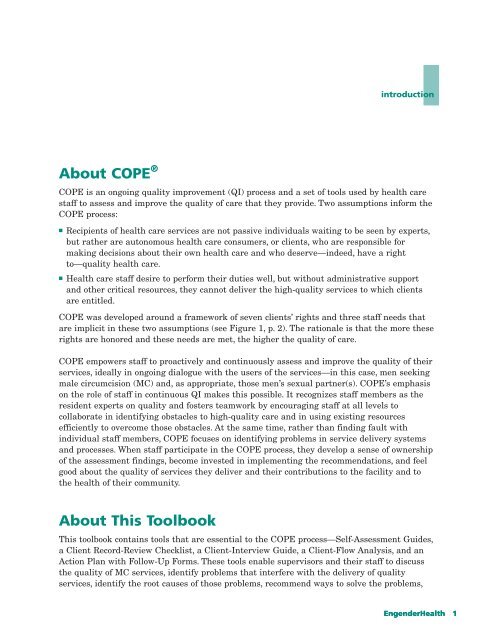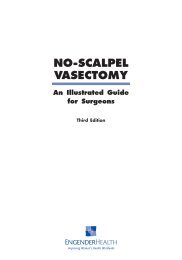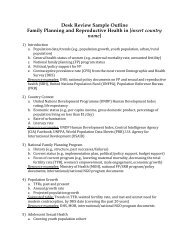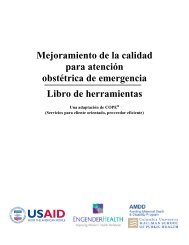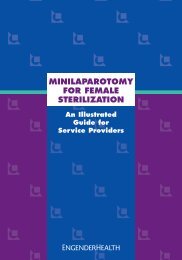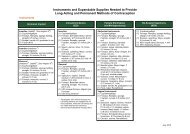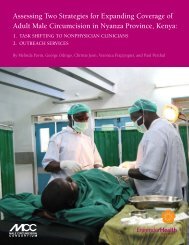COPE® FOR MALE CIRCUMCISION SERVICES - EngenderHealth
COPE® FOR MALE CIRCUMCISION SERVICES - EngenderHealth
COPE® FOR MALE CIRCUMCISION SERVICES - EngenderHealth
You also want an ePaper? Increase the reach of your titles
YUMPU automatically turns print PDFs into web optimized ePapers that Google loves.
I<br />
introduction<br />
About COPE ®<br />
COPE is an ongoing quality improvement (QI) process and a set of tools used by health care<br />
staff to assess and improve the quality of care that they provide. Two assumptions inform the<br />
COPE process:<br />
■ Recipients of health care services are not passive individuals waiting to be seen by experts,<br />
but rather are autonomous health care consumers, or clients, who are responsible for<br />
making decisions about their own health care and who deserve—indeed, have a right<br />
to—quality health care.<br />
■ Health care staff desire to perform their duties well, but without administrative support<br />
and other critical resources, they cannot deliver the high-quality services to which clients<br />
are entitled.<br />
COPE was developed around a framework of seven clients’ rights and three staff needs that<br />
are implicit in these two assumptions (see Figure 1, p. 2). The rationale is that the more these<br />
rights are honored and these needs are met, the higher the quality of care.<br />
COPE empowers staff to proactively and continuously assess and improve the quality of their<br />
services, ideally in ongoing dialogue with the users of the services—in this case, men seeking<br />
male circumcision (MC) and, as appropriate, those men’s sexual partner(s). COPE’s emphasis<br />
on the role of staff in continuous QI makes this possible. It recognizes staff members as the<br />
resident experts on quality and fosters teamwork by encouraging staff at all levels to<br />
collaborate in identifying obstacles to high-quality care and in using existing resources<br />
efficiently to overcome those obstacles. At the same time, rather than finding fault with<br />
individual staff members, COPE focuses on identifying problems in service delivery systems<br />
and processes. When staff participate in the COPE process, they develop a sense of ownership<br />
of the assessment findings, become invested in implementing the recommendations, and feel<br />
good about the quality of services they deliver and their contributions to the facility and to<br />
the health of their community.<br />
About This Toolbook<br />
This toolbook contains tools that are essential to the COPE process—Self-Assessment Guides,<br />
a Client Record-Review Checklist, a Client-Interview Guide, a Client-Flow Analysis, and an<br />
Action Plan with Follow-Up Forms. These tools enable supervisors and their staff to discuss<br />
the quality of MC services, identify problems that interfere with the delivery of quality<br />
services, identify the root causes of those problems, recommend ways to solve the problems,<br />
<strong>EngenderHealth</strong> 1


